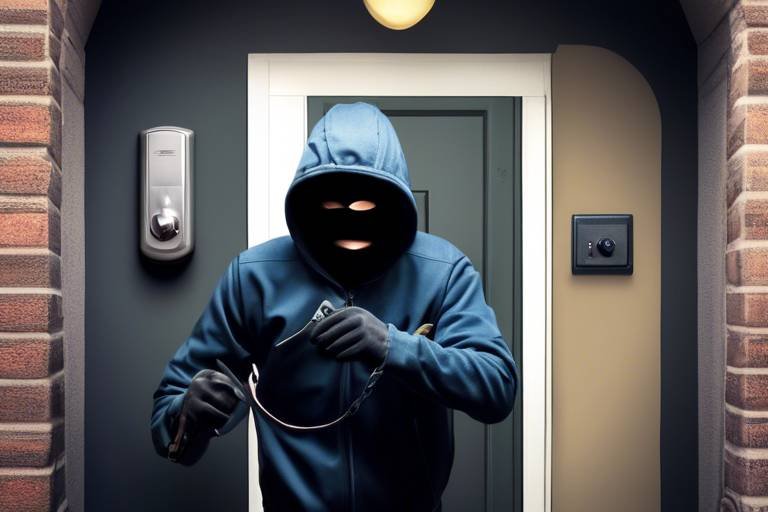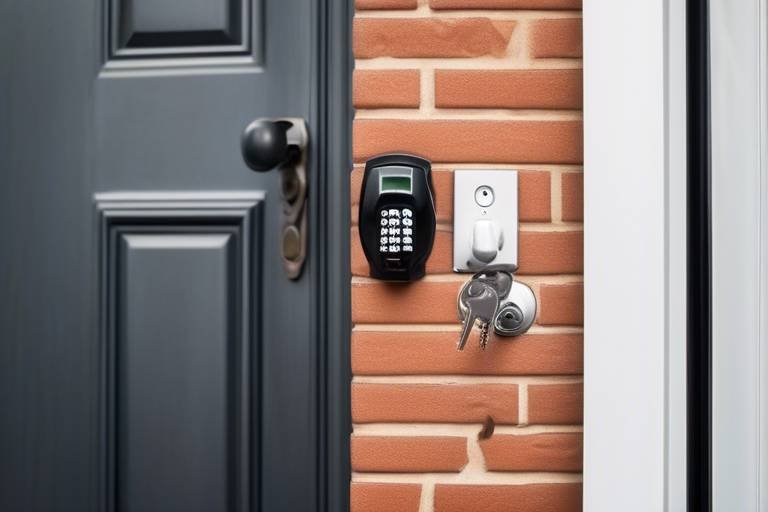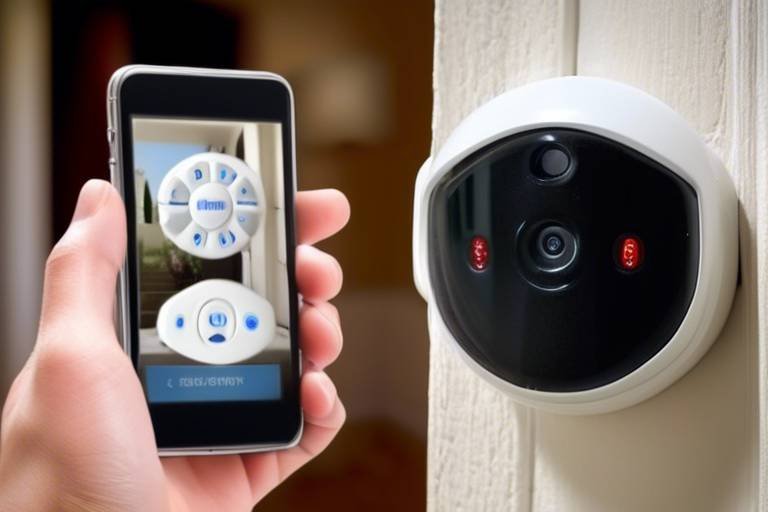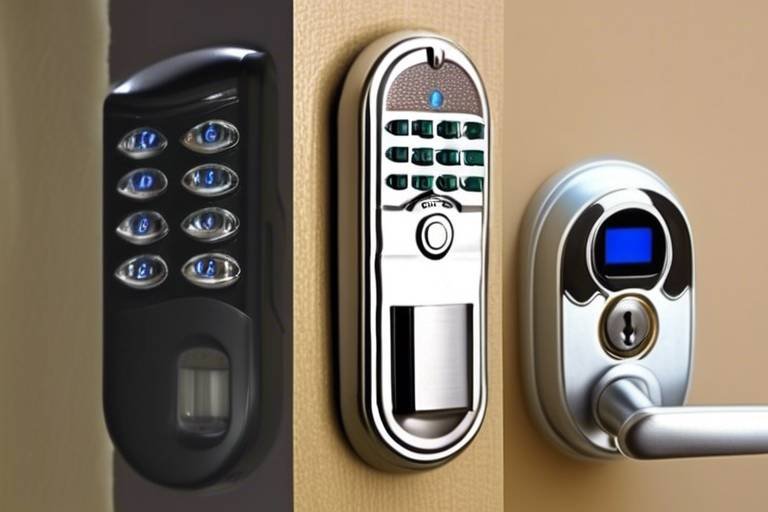Burglary Prevention Tips You Should Know
Burglary is a frightening reality for many homeowners, but it doesn't have to be. With the right knowledge and proactive measures, you can significantly reduce the risk of a break-in. In this article, we will explore essential tips and strategies that will help you safeguard your home and give you peace of mind. By understanding the risks and implementing effective security measures, you can create a fortress around your property that deters even the most determined intruders. So, let’s dive into the world of burglary prevention and arm ourselves with the tools we need to protect our homes!
Before we can effectively prevent burglary, it’s crucial to understand the common risks and vulnerabilities that homes face. Various factors contribute to burglary, including location, property features, and neighborhood crime rates. For instance, homes situated in isolated areas or neighborhoods with higher crime rates are often targeted. Additionally, properties with poor lighting or overgrown landscaping can provide cover for burglars. By identifying these risks, you can take informed steps to enhance your home’s security.
Did you know that the majority of burglaries occur through unsecured doors and windows? That’s right! It’s vital to assess your entry points and ensure they are fortified. Consider investing in high-quality locks and reinforcements for your doors and windows. Installing an alarm system can also act as a strong deterrent. Remember, a well-secured home is less appealing to potential intruders.
Investing in robust door security is crucial for every homeowner. Start by upgrading your locks to deadbolts, which are much harder to pick than standard locks. Additionally, consider reinforcing your door frames with steel plates or installing a smart lock that allows you to monitor access remotely. These measures not only enhance security but also provide peace of mind knowing your home is well-protected.
Windows are often overlooked when it comes to home security. However, they can be a vulnerable entry point. Installing window locks is a simple yet effective way to secure them. You might also want to consider applying security films, which can make glass shatter-resistant. Furthermore, window sensors can alert you if a window is opened or broken, adding an extra layer of protection.
An effective alarm system can be a strong deterrent against burglars. When choosing an alarm system, consider options that include both monitored systems and DIY setups. Monitored systems provide 24/7 surveillance and immediate response, while DIY systems can be more budget-friendly and customizable. Regardless of the type you choose, having an alarm system in place can significantly enhance your home’s security.
The exterior of your home plays a significant role in burglary prevention. Effective outdoor security measures include proper landscaping, lighting, and surveillance cameras. For instance, keeping bushes trimmed and installing motion-activated lights can eliminate hiding spots for potential intruders. Additionally, placing security cameras around your property not only deters criminals but can also provide valuable evidence in case of a break-in.
Community involvement is vital in crime prevention. Establishing or joining a neighborhood watch program can foster vigilance and cooperation among residents. By working together, neighbors can keep an eye out for suspicious activities and report them to local authorities. This collaborative approach not only enhances security but also builds stronger community ties.
Strong community ties can enhance security. Engaging with your neighbors can lead to increased awareness and quicker responses to suspicious activities. Consider organizing community events or regular meetings to discuss safety concerns. When neighbors know each other, they are more likely to look out for one another, creating a safer environment for everyone.
Knowing how to report suspicious behavior is essential for maintaining safety in your neighborhood. If you notice anything unusual, don’t hesitate to contact local authorities. It’s better to be safe than sorry! Familiarize yourself with the local reporting procedures and encourage your neighbors to do the same. Quick reporting can prevent potential crimes and keep your community safe.
Understanding your insurance coverage is crucial in the event of a burglary. Review your home insurance policy to ensure it includes adequate coverage for theft and damage. Knowing your legal rights is equally important. Familiarize yourself with the necessary steps to take after a break-in, including filing police reports and notifying your insurance company. Being prepared can save you time and stress in a difficult situation.
Selecting an appropriate insurance policy can protect your assets. Look for key features such as coverage for personal property, liability protection, and additional living expenses in case you need to temporarily relocate. Understanding the fine print can help you make an informed decision and ensure comprehensive coverage against burglary.
If a burglary occurs, knowing your legal rights is important. Start by filing a police report and documenting any stolen items or damage. It’s also crucial to notify your insurance company promptly. They may require specific documentation, so keep a detailed record of everything related to the incident. Being proactive can help you navigate the aftermath of a burglary more effectively.
- What are the most common entry points for burglars? Doors and windows are the most frequent entry points, especially if they are not secured properly.
- How can I make my home less appealing to burglars? Keep your property well-lit, maintain your landscaping, and secure all entry points.
- Are alarm systems worth the investment? Yes, alarm systems can significantly deter burglars and provide peace of mind.
- What should I do if I see suspicious activity in my neighborhood? Report it to local authorities as soon as possible to keep your community safe.
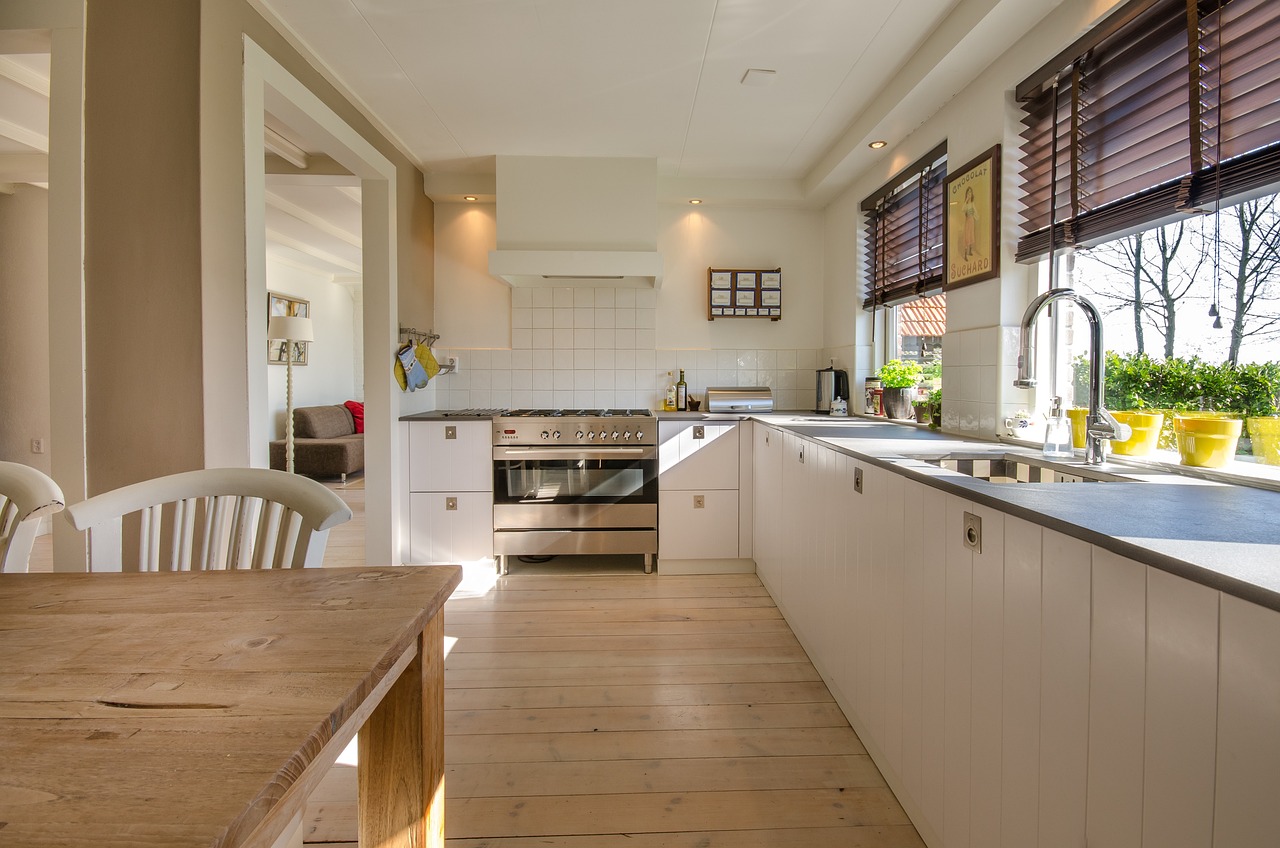
Understanding Burglary Risks
To effectively tackle the issue of burglary, it's essential to first grasp the underlying risks and vulnerabilities that can make your home an easy target. Think of your house as a fortress; every fortress has its weak points, and knowing these can significantly enhance your defenses. Various factors contribute to the likelihood of a burglary, and understanding them can empower you to take proactive steps in safeguarding your property.
One of the primary factors is the location of your home. For instance, homes situated in areas with higher crime rates are more susceptible to break-ins. You might be wondering, "How do I find out about my neighborhood's crime statistics?" Many online resources and local police departments provide crime maps and reports, giving you a clearer picture of the risks in your area. Besides crime rates, the visibility of your home can also play a critical role. A house that is hidden from the street or surrounded by dense foliage can attract burglars who prefer to operate unseen.
Another significant factor is the features of your property. Homes with easily accessible entry points, such as ground-level windows or poorly secured doors, are prime targets. Have you ever thought about how many entry points your home has? Consider the following:
- Front and back doors
- Windows on the ground floor
- Garage doors
- Basement access
Each of these points can be a potential vulnerability. Additionally, the presence of valuable items within your home can also attract unwanted attention. If a burglar can see high-value electronics or jewelry through a window, they might be more inclined to break in.
Moreover, the time of day can influence burglary risks. Most burglaries occur during the day when homeowners are at work or school, making it easier for intruders to slip in unnoticed. This is why enhancing your home security during those hours is crucial. Think of it like a game of hide and seek; the better you hide your valuables and secure your home, the less likely you are to be found.
By understanding these risks—location, property features, visibility, and timing—you can take meaningful action to fortify your home against potential break-ins. Remember, knowledge is power, and being aware of the threats is the first step in effectively preventing them.
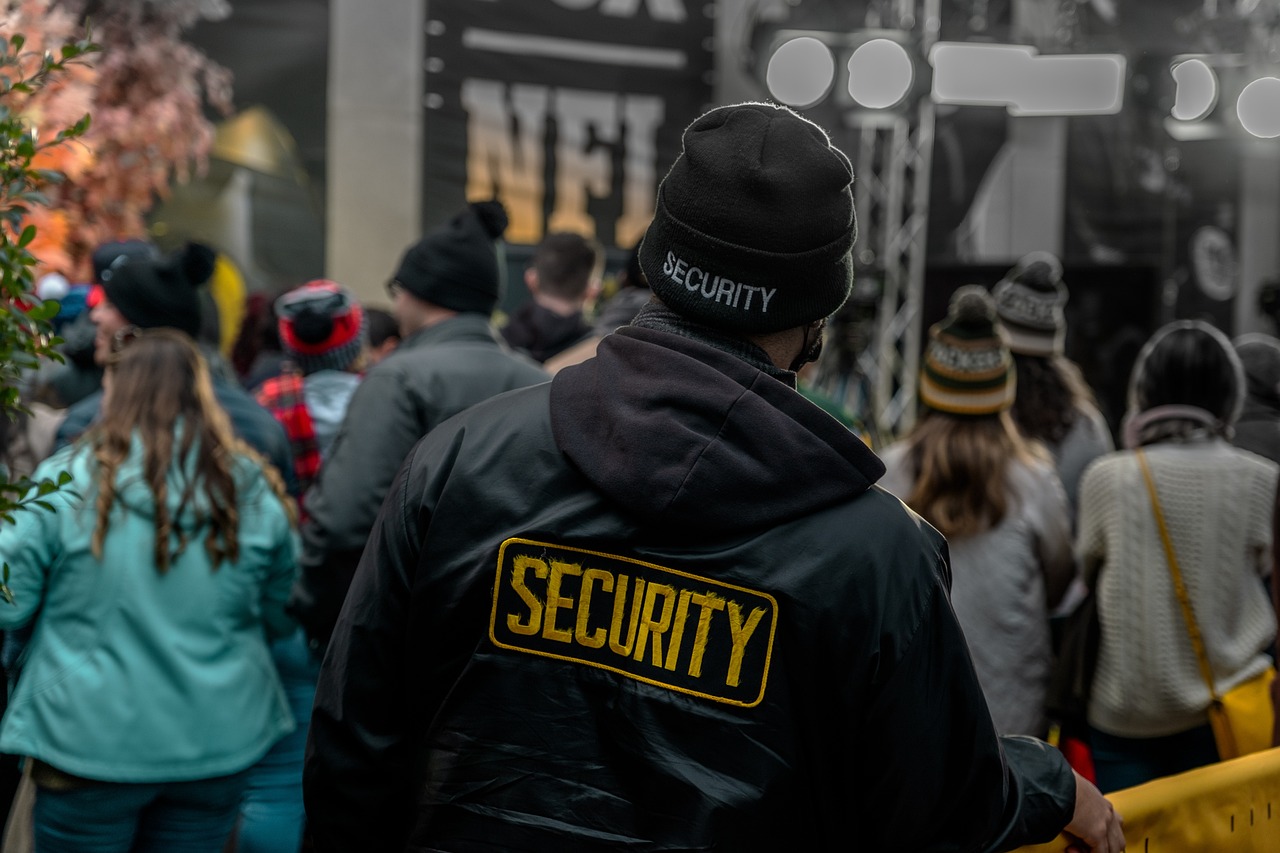
Securing Entry Points
When it comes to safeguarding your home, is your first line of defense. Did you know that the majority of burglaries occur through unsecured doors and windows? It's true! These entry points can often be the easiest targets for intruders, making it essential for homeowners to take proactive measures to enhance their security. Think of your home as a fortress; if the gates are weak, the castle can easily be invaded. So, let's dive into some effective strategies to fortify these vulnerable spots.
One of the most critical aspects of securing entry points is ensuring that your doors are robust and properly fitted. You might want to consider investing in high-quality deadbolt locks, which provide an extra layer of protection compared to standard doorknob locks. Additionally, reinforcing your door frames can significantly increase their resistance against forced entry. It's like adding armor to your fortress; the stronger the door, the less appealing it is for a would-be burglar.
Windows, often overlooked in security plans, can also be a weak link in your home’s defenses. Many homeowners assume that simply closing the windows is enough, but that’s not always the case. Installing window locks is a great start, but for added security, consider using security films that make glass more resistant to shattering. Imagine a burglar trying to break a window only to find that it’s much tougher than expected—this can be a significant deterrent! Moreover, adding sensors that alert you when windows are opened or tampered with can provide peace of mind, especially if you're away from home.
Let’s not forget about alarm systems. An effective alarm system can be a strong deterrent against burglars. When choosing an alarm system, you have various options to fit different needs and budgets. Some homeowners prefer monitored systems that alert local authorities in case of a breach, while others might opt for DIY setups that allow for more customization. Regardless of your choice, having an alarm system in place sends a clear message: your home is protected, and breaking in would be a risky endeavor.
In addition to doors and windows, consider the overall landscaping around your home. Overgrown bushes and trees can provide hiding spots for intruders, making it easier for them to approach your entry points unnoticed. Keeping your yard well-maintained not only enhances the aesthetic appeal of your home but also improves visibility, making it less attractive for criminals. Installing motion-sensor lights can further illuminate dark areas, creating a well-lit environment that deters potential burglars.
In conclusion, securing entry points is a multi-faceted approach that involves assessing and enhancing the locks, frames, and overall security of your doors and windows. By taking these steps, you can significantly reduce the risk of a break-in and protect your home and loved ones. Remember, the best defense is a good offense—so start fortifying your fortress today!
- What is the best type of lock for my front door? A high-security deadbolt lock is recommended for maximum protection.
- How can I secure my windows? Install window locks, security films, and sensors to enhance window security.
- Are alarm systems worth the investment? Yes, alarm systems can deter burglars and provide peace of mind.
- How can landscaping affect home security? Well-maintained landscaping improves visibility and reduces hiding spots for intruders.

Door Security Measures
When it comes to safeguarding your home, door security is a fundamental aspect that should never be overlooked. Think of your door as the first line of defense against intruders. If this line is weak, the whole structure of your home’s security crumbles. So, what can you do to bolster this critical barrier? First and foremost, investing in high-quality locks is essential. A sturdy deadbolt lock is a must-have; it’s like adding an extra layer of armor to your door. Make sure it’s installed correctly, as even the best lock can be ineffective if poorly fitted.
Additionally, consider the type of door you have. Wooden doors can be easily compromised, while metal doors provide a higher level of security. If you’re in the market for a new door, opt for one made from solid materials. Furthermore, you can enhance security by reinforcing the door frame with a steel plate. This simple upgrade can make it much harder for an intruder to kick in your door.
Another critical factor is the use of smart technology. Smart locks are becoming increasingly popular for their convenience and added security features. These locks can be controlled via a smartphone app, allowing you to lock or unlock your door remotely. Imagine being able to let a friend in while you’re at work or receiving alerts when someone tries to tamper with your door. It’s like having a personal security guard at your fingertips!
To give you a better understanding of how different locks compare, here’s a quick table summarizing the features of various door security options:
| Type of Lock | Security Level | Features |
|---|---|---|
| Deadbolt | High | Requires a key or thumb turn to unlock; difficult to pick. |
| Smart Lock | High | Keyless entry, remote access, and alerts for suspicious activity. |
| Chain Lock | Medium | Provides additional protection but can be easily bypassed. |
| Sliding Door Lock | Medium | Secures sliding doors but can be vulnerable if not reinforced. |
Lastly, don’t forget about the importance of door visibility. A well-lit entryway can deter would-be burglars. Consider installing motion-sensor lights around your front door. Imagine walking up to your house at night, and suddenly, the lights flick on, illuminating the area. It’s a simple yet effective way to make your home less inviting to intruders.
In conclusion, securing your doors is not just about installing locks; it’s about creating a comprehensive security strategy. By combining strong locks, smart technology, and proper lighting, you can significantly reduce the risk of a break-in. Remember, your home is your sanctuary—protect it fiercely!
- What is the best type of lock for my front door? A deadbolt lock is generally considered the best option for front doors due to its high-security level.
- Are smart locks worth the investment? Yes, smart locks offer convenience and enhanced security features that can be beneficial for homeowners.
- How can I reinforce my door frame? Installing a steel plate around the door frame can significantly increase its strength and resistance to forced entry.
- Do outdoor lights really deter burglars? Yes, well-lit areas are less appealing to criminals, making outdoor lighting an effective deterrent.

Window Security Options
When it comes to securing your home, windows are often the most vulnerable points of entry that many homeowners overlook. Did you know that over 30% of burglars enter through unsecured windows? That’s a staggering statistic that should make anyone sit up and take notice! To safeguard your home, it’s essential to invest in effective window security options that not only enhance your defenses but also give you peace of mind.
First on the list of window security options is the installation of window locks. These locks come in various forms, including sliding locks, pin locks, and key-operated locks. By ensuring that every window in your home is fitted with a secure locking mechanism, you can significantly reduce the risk of unauthorized entry. Additionally, consider using reinforced glass or laminated glass, which are much harder to break than standard glass. This extra layer of protection can deter even the most determined intruders.
Another effective measure is the application of security films on your windows. These films are designed to hold the glass together even if it shatters, making it much more difficult for a burglar to gain access. In fact, security films can delay entry by several minutes, which is often enough to alert you or your neighbors to suspicious activity. Moreover, these films can also provide UV protection, reducing fading of your furniture and carpets.
For those looking for a more high-tech approach, window sensors are a fantastic investment. These devices can be integrated into your existing home security system and will send an alert to your smartphone or security company if a window is opened or broken. Imagine being at work and receiving a notification that a window has been compromised! This instant feedback allows you to take action quickly, potentially catching the intruder in the act or alerting the authorities.
In addition to these options, don’t forget about the importance of landscaping. Trim back any trees or bushes that could provide cover for a burglar attempting to access your windows. A well-lit exterior can also deter potential intruders. Consider installing motion-sensor lights near your windows to illuminate any suspicious activity. Remember, an intruder is much less likely to attempt a break-in if they know they are in the spotlight!
Lastly, it’s worth mentioning that window security is not just about physical deterrents. Being vigilant and aware of your surroundings can make a significant difference. Engage with your neighbors and encourage them to do the same. A community that watches out for each other can effectively deter crime in the neighborhood. So, take these steps to fortify your windows, and you’ll sleep a little easier at night knowing you’ve done your part to protect your home.
- What is the best type of window lock?
The best type of window lock depends on your specific needs, but key-operated locks and sliding locks are generally considered the most secure options.
- How effective are security films?
Security films can significantly enhance window security by holding glass shards together, making it harder for intruders to break in.
- Do window sensors require a professional installation?
While some window sensors can be installed by homeowners, others may require professional installation for optimal performance.
- Can landscaping really deter burglars?
Absolutely! Proper landscaping can eliminate hiding spots for burglars, making your home less attractive as a target.

Alarm Systems and Monitoring
When it comes to securing your home, one of the most effective deterrents against burglary is a reliable alarm system. Think of it as your home’s personal bodyguard, always on the lookout for intruders. Alarm systems not only alert you and the authorities in case of a break-in but also act as a psychological barrier that can prevent crimes from even happening. Many burglars will simply skip a house that has visible security measures in place. But with so many options out there, how do you choose the right system for your needs?
First, let’s explore the different types of alarm systems available. You can opt for a monitored alarm system, where a professional monitoring service keeps an eye on your home 24/7. If the alarm goes off, they will promptly contact the authorities. This is like having a security team on standby, ready to spring into action at a moment’s notice. On the other hand, a DIY alarm system allows you to set up your own security measures without the ongoing monthly fees. While it may not provide the same level of immediate response, it can still be effective if you’re vigilant about monitoring your system.
Another consideration is the technology behind these systems. Many modern alarm systems come equipped with advanced features such as smart home integration, allowing you to control your security features from your smartphone. Imagine being able to check your home’s status, receive alerts when someone enters your property, or even view live camera feeds while you’re at work or on vacation. It’s like having eyes everywhere, providing you with peace of mind no matter where you are.
To illustrate the differences between various alarm systems, here’s a simple comparison table:
| Alarm Type | Monitoring | Cost | Features |
|---|---|---|---|
| Monitored System | 24/7 Professional Monitoring | Higher (monthly fees) | Emergency response, smart home integration |
| DIY System | No Professional Monitoring | Lower (one-time purchase) | Customizable, app control |
Ultimately, the choice between a monitored and DIY system comes down to your personal preferences and budget. Regardless of which option you choose, it’s essential to ensure that your alarm system is installed correctly and maintained regularly. A faulty alarm is just as good as no alarm at all, so consider scheduling periodic checks to keep everything in tip-top shape.
Moreover, you should also think about integrating additional monitoring options, such as security cameras and motion sensors. These devices can work in tandem with your alarm system to provide comprehensive coverage of your property. For instance, if a motion sensor detects movement, it can trigger the alarm and send you an alert simultaneously. This layered approach to security can significantly enhance your home’s defenses.
In conclusion, investing in a quality alarm system is a crucial step in safeguarding your home from potential intruders. With various options available, you can select a system that fits your lifestyle and budget. Remember, the goal is not just to react to a burglary but to prevent one from happening in the first place. So take the plunge, equip your home with an effective alarm system, and enjoy the peace of mind that comes with knowing you’ve done your part to protect your sanctuary.
- What is the best type of alarm system for a home? The best type depends on your needs; monitored systems offer professional oversight, while DIY systems are more cost-effective.
- How often should I test my alarm system? It's recommended to test your alarm system at least once a month to ensure everything is functioning correctly.
- Can I install an alarm system myself? Yes, many DIY systems are designed for easy installation without professional help.
- Will an alarm system lower my home insurance? Many insurance companies offer discounts for homes equipped with alarm systems, so it's worth checking with your provider.

Outdoor Security Enhancements
When it comes to protecting your home from burglary, the exterior is just as important as the interior. Think of your home as a fortress; the stronger the walls and the more vigilant the guards, the less likely it is for intruders to breach your defenses. Outdoor security enhancements can significantly reduce the risk of a break-in and provide you with peace of mind. So, what can you do to fortify your castle? Let’s dive into some effective strategies!
First off, landscaping plays a crucial role in your home's security. Overgrown bushes and trees can provide excellent hiding spots for burglars. Instead, consider keeping your shrubs trimmed and opting for thorny plants near windows and doors. This not only beautifies your yard but also makes it less inviting for unwanted guests. Additionally, maintaining visibility is key—ensure that your windows aren’t obscured by tall plants or decorative features.
Next, let’s talk about lighting. A well-lit exterior can be a burglar's worst nightmare. Installing motion-sensor lights around your property is an excellent way to deter criminals. These lights activate when they detect movement, startling intruders and illuminating the area. You might also consider using solar-powered lights, which are energy-efficient and easy to install. Placing these lights strategically near entry points, walkways, and driveways can create a well-lit perimeter that enhances safety.
Surveillance cameras are another powerful tool in your outdoor security arsenal. Modern cameras come equipped with features like night vision, motion detection, and remote access, allowing you to monitor your property from anywhere. Not only do these cameras help you keep an eye on things, but their mere presence can deter potential burglars. To maximize their effectiveness, place cameras at all entry points and consider using signage to inform would-be intruders that they are being watched.
Additionally, consider installing a security system that integrates outdoor alarms. These systems can alert you to any suspicious activity outside your home. For example, some systems can trigger an alarm if someone crosses a designated perimeter. This proactive approach can help you catch intruders before they even reach your door.
In summary, enhancing your outdoor security involves a combination of smart landscaping, effective lighting, surveillance, and alarm systems. By taking these steps, you’re not just protecting your home; you’re also creating a sense of community safety. Remember, a well-secured home is a happy home!
- What are the best outdoor security enhancements for my home?
Some of the best enhancements include motion-sensor lights, surveillance cameras, and maintaining clear visibility with proper landscaping. - How effective are motion-sensor lights?
Motion-sensor lights are highly effective as they startle potential intruders and illuminate areas that could be hiding spots. - Can landscaping really deter burglars?
Yes, by keeping shrubs trimmed and using thorny plants near entry points, you can make your home less appealing to burglars. - Should I install a security system even if I have outdoor cameras?
Yes, a security system adds an extra layer of protection and can alert you to suspicious activities that cameras alone might miss.

Neighborhood Watch Programs
When it comes to keeping our homes safe, it's not just about what we do inside our four walls; it's also about how we engage with our neighbors. are a fantastic way to foster community spirit and enhance overall security. Imagine a scenario where everyone in your neighborhood is looking out for one another—a collective eye that can spot suspicious activities and deter potential criminals. This isn't just a dream; it's a reality that can be achieved through effective neighborhood watch initiatives.
These programs encourage residents to communicate regularly about their concerns and observations, creating a network of vigilance that can significantly reduce crime rates. When people feel connected, they are more likely to notice when something seems out of place. For instance, if a neighbor sees an unfamiliar vehicle parked in front of a home at odd hours, they might think twice about ignoring it. Instead of just shrugging it off, they can reach out to their neighbors or even local law enforcement. This proactive approach can make all the difference.
Participating in or starting a neighborhood watch program can be as simple as gathering a few interested neighbors for a casual meeting. During this meeting, you can discuss the specific concerns of your community, share safety tips, and establish a plan for reporting suspicious activities. Many neighborhoods have found success in using communication tools like group chats or social media platforms to keep everyone informed. Regular updates can include reminders about locking doors, keeping outdoor lights on, or even sharing information about local crime trends.
To further illustrate the benefits of neighborhood watch programs, consider the following table that highlights key advantages:
| Advantage | Description |
|---|---|
| Enhanced Security | Neighbors working together can identify and report suspicious activities more effectively. |
| Community Engagement | Fosters relationships among residents, creating a sense of belonging and responsibility. |
| Crime Deterrence | Visible community involvement can discourage criminals from targeting the area. |
| Resource Sharing | Neighbors can share safety resources, tips, and experiences, making everyone more informed. |
In addition to these benefits, neighborhood watch programs often receive support from local law enforcement. Many police departments provide training sessions for watch members, covering topics such as identifying suspicious behavior and effectively reporting incidents. This collaboration not only enhances the skills of the participants but also builds trust between the community and law enforcement.
Ultimately, the success of a neighborhood watch program hinges on active participation and communication. It’s essential to keep the momentum going through regular meetings, social events, or even community projects that promote safety and awareness. By nurturing these connections, you create a neighborhood that is not only safer but also more vibrant and cohesive.
So, are you ready to take the plunge? Whether you’re joining an existing program or starting your own, remember that every little bit helps. The more eyes and ears on the lookout, the safer your community will be. Together, we can create a fortress of safety, where everyone feels secure in their homes and neighborhoods.
- What is a Neighborhood Watch Program? - A community-based initiative where residents work together to monitor and report suspicious activities.
- How do I start a Neighborhood Watch Program? - Gather interested neighbors, discuss concerns, and establish a communication plan.
- What support can I expect from local law enforcement? - Many police departments offer training and resources to assist neighborhood watch groups.
- Are there any costs associated with starting a Neighborhood Watch? - Generally, there are no costs, but some neighborhoods may choose to fundraise for materials or events.

Building Community Relationships
When it comes to enhancing your home's security, one of the most powerful tools at your disposal is the strength of your community. Building strong relationships with your neighbors can create a network of support that not only helps you feel safer but also fosters an environment where everyone looks out for one another. Imagine living in a neighborhood where everyone knows each other, and suspicious activities are quickly reported—this is the essence of a community that prioritizes safety.
Engaging with your neighbors doesn’t have to be a daunting task. Start by introducing yourself and having casual conversations. You could organize a small gathering, like a barbecue or a potluck, to break the ice and get to know each other better. This informal setting can help establish trust and make it easier to discuss safety concerns. The more familiar you are with your neighbors, the more likely you are to notice if something feels off in your surroundings.
Additionally, consider forming a neighborhood watch program. This initiative encourages residents to keep an eye on each other’s properties and report any suspicious behavior to local authorities. Here are some benefits of participating in or starting a neighborhood watch:
- Improved Awareness: Regular meetings can help residents stay informed about local crime trends and safety tips.
- Stronger Bonds: Working together fosters a sense of camaraderie and responsibility among neighbors.
- Quick Response: A connected community can respond more swiftly to suspicious activities, potentially deterring criminals.
Moreover, technology can play a role in strengthening these relationships. Consider creating a neighborhood group on social media platforms where residents can share updates, alerts, and community news. This digital space can serve as a virtual neighborhood watch, allowing for real-time communication and support.
Ultimately, the goal is to cultivate a sense of belonging and vigilance within your community. When neighbors look out for one another, it creates a culture of safety that can significantly reduce the risk of burglary. So, take the first step today—reach out to your neighbors, engage in meaningful conversations, and build a community that prioritizes security and well-being for all.
Q1: How can I start a neighborhood watch program?
A1: Begin by gathering interested neighbors and scheduling a meeting. Discuss your goals, establish communication methods, and coordinate with local law enforcement for guidance and support.
Q2: What should I do if I notice suspicious activity?
A2: Trust your instincts. If something feels off, report it to local authorities immediately. Provide as much detail as possible, including descriptions of individuals or vehicles involved.
Q3: How often should neighborhood watch meetings be held?
A3: It varies by community, but quarterly meetings can be effective for sharing updates and reinforcing safety strategies. Adjust the frequency based on community needs.

Reporting Suspicious Activities
When it comes to keeping your neighborhood safe, being vigilant and proactive is key. Imagine your community as a team, where each member plays a crucial role in maintaining security. If you notice anything out of the ordinary, it's essential to report it promptly. But what exactly constitutes suspicious activity? Well, it could range from someone lurking around your neighbor's house at odd hours to a car that seems to be circling the block repeatedly. These behaviors can often be indicators of potential criminal activity, and your instincts may be your best guide.
So, how do you effectively report these suspicious activities? First, gather as much information as possible. Take note of the time, location, and a detailed description of the person or vehicle involved. If you can, make a mental note of any distinguishing features, such as clothing or license plate numbers. This information can be invaluable to law enforcement. Remember, the more details you provide, the better equipped they will be to investigate the situation.
Next, it’s important to know who to contact. Most communities have a non-emergency police number that you can call for reporting suspicious activities. If you feel that there is an immediate threat or danger, don’t hesitate to dial 911. In some cases, you might also have the option to report activities through local community apps or neighborhood watch programs. These platforms can facilitate quicker communication and foster a sense of community vigilance.
Additionally, consider discussing your observations with your neighbors. Sharing information can create a stronger network of awareness and help everyone stay alert to potential threats. You might even find that others have noticed the same suspicious activities, which can strengthen your case when reporting. After all, there’s strength in numbers, and a united community is a formidable barrier against crime.
Lastly, keep in mind that while it’s crucial to be aware, it’s equally important not to jump to conclusions. Not every unusual behavior indicates criminal intent. Sometimes, what seems suspicious may have a perfectly innocent explanation. However, erring on the side of caution is always wise. If you feel something is off, trust your instincts and report it. Your proactive approach could make a significant difference in keeping your neighborhood safe.
- What should I do if I see something suspicious? If you see something that raises your suspicion, gather as much information as you can and report it to the local authorities. If it's an emergency, call 911 immediately.
- How do I know if something is suspicious? Suspicious activities may include unusual behavior, such as someone loitering, trying to open doors, or vehicles that seem out of place. Trust your instincts; if it feels wrong, report it.
- Can I remain anonymous when reporting suspicious activities? Yes, many police departments allow for anonymous tips. Check with your local department for their specific procedures.
- What if I report something and it turns out to be nothing? It's better to be safe than sorry! Reporting suspicious activities can help prevent crime, and law enforcement appreciates community involvement.

Insurance and Legal Considerations
When it comes to safeguarding your home against burglary, understanding insurance and legal considerations is just as crucial as physical security measures. Imagine investing in a high-tech security system only to find out that your insurance policy doesn’t cover theft or damages adequately. This is why it’s essential to be proactive about your insurance options and legal rights.
First off, let’s talk about home insurance. Not all policies are created equal. Some might cover theft but not the damage caused by the break-in, while others might have specific exclusions. It’s vital to read the fine print and understand what your policy entails. Here are some key features to look for:
- Coverage for personal belongings: Ensure that your valuables are covered, including electronics, jewelry, and collectibles.
- Replacement cost vs. actual cash value: Know whether your policy will replace stolen items at their current value or their original purchase price.
- Liability coverage: This protects you in case someone gets injured on your property during a break-in.
Once you have a solid insurance policy in place, it’s crucial to understand the legal steps to take if a burglary occurs. The first step is to contact the police. Filing a police report not only helps in recovering stolen items but also serves as a necessary document for your insurance claim. Additionally, you should notify your insurance company as soon as possible to initiate the claims process. Most insurers require a report to be filed within a specific timeframe, so don’t delay.
Here’s a quick rundown of the essential legal steps to follow after a burglary:
- Contact the police and file a report.
- Document the scene with photographs and a list of stolen items.
- Notify your insurance company and provide them with the police report.
- Follow up with your insurer to ensure your claim is processed.
Understanding your legal rights is also vital. You have the right to seek compensation for your losses, but this can vary based on your state laws and the specifics of your insurance policy. Familiarizing yourself with local regulations can empower you to take the necessary actions to protect your interests.
In summary, while securing your home physically is essential, don’t overlook the importance of having the right insurance and understanding the legal landscape in case of a burglary. By being informed, you can navigate the aftermath of a break-in more smoothly and ensure that you’re adequately covered.
Q1: What should I do immediately after a burglary?
A1: First, ensure your safety and then contact the police to file a report. Document the scene and notify your insurance company as soon as possible.
Q2: Does homeowners insurance cover burglary?
A2: Most homeowners insurance policies do cover theft, but it’s essential to check your specific policy for details on coverage limits and exclusions.
Q3: How can I ensure my valuables are covered?
A3: Review your policy to see what items are covered and consider adding a rider for high-value items like jewelry or collectibles for full protection.
Q4: What are my legal rights after a burglary?
A4: You have the right to report the crime, claim compensation through your insurance, and seek legal advice if necessary. Understanding local laws can help protect your interests.
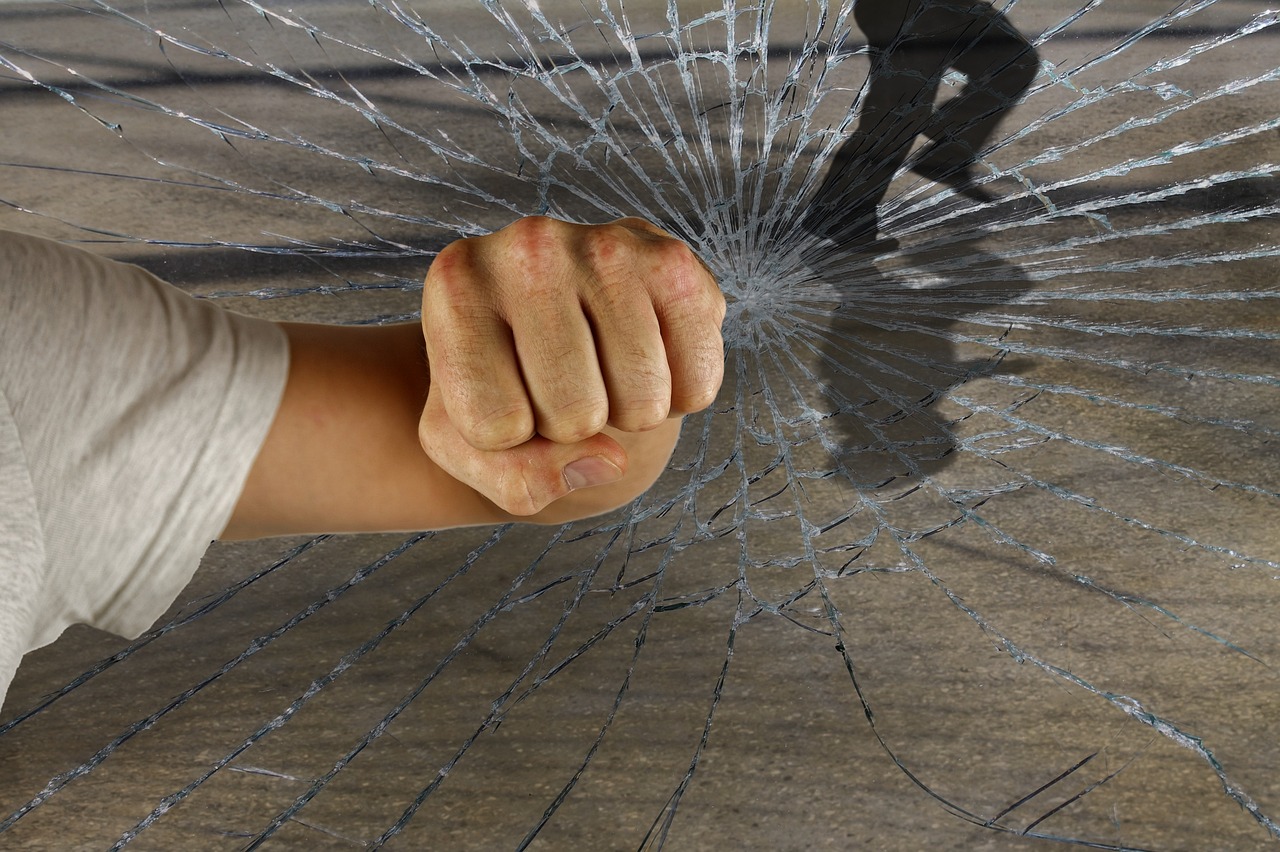
Choosing the Right Insurance Policy
When it comes to protecting your home against burglary, choosing the right insurance policy is as critical as installing the best locks on your doors. You wouldn't want to find yourself in a situation where, after a break-in, you realize that your coverage is insufficient or that it doesn't cover the items that mean the most to you. So, what should you look for in a home insurance policy? Let's break it down.
First and foremost, you should consider the coverage limits. This refers to the maximum amount your insurance will pay out in the event of a claim. If your home is filled with valuable items—think electronics, jewelry, or collectibles—make sure your policy covers their full replacement value. Many policies offer a standard coverage amount, but you might need to purchase additional coverage for high-value items. It’s like having a safety net; you want it to be big enough to catch everything you care about!
Next, examine the deductibles. This is the amount you’ll need to pay out of pocket before your insurance kicks in. A higher deductible usually means lower monthly premiums, but it also means you'll pay more upfront in case of a burglary. Finding the right balance is key. Think of it as choosing between a sturdy umbrella that can withstand a storm but is heavier to carry, versus a lighter one that might flip inside out at the first gust of wind.
Additionally, it’s important to check for additional coverages that might be relevant to you. Some policies include coverage for theft of personal belongings, while others might offer protection for temporary living expenses if your home becomes uninhabitable due to a break-in. You should also look into liability coverage, which protects you in case someone gets injured on your property during a burglary. This is essential because it ensures that you're not left vulnerable to lawsuits.
Another aspect to consider is the claims process. Before you sign on the dotted line, do a little research on the insurance company’s reputation regarding claims handling. A company that is known for being difficult during the claims process can turn a stressful situation into a nightmare. Look for reviews or ask friends and family about their experiences. Remember, in those moments of crisis, you want to be supported, not further stressed.
Lastly, don’t hesitate to consult an insurance agent. They can provide valuable insights tailored to your specific needs and help you navigate the complexities of different policies. Think of them as your personal guide through a dense forest of options, ensuring you don’t get lost along the way. By taking the time to understand your options and asking the right questions, you can find a policy that not only protects your home but also gives you peace of mind.
In conclusion, choosing the right insurance policy is like assembling a puzzle. Each piece—coverage limits, deductibles, additional coverages, claims processes, and expert advice—needs to fit perfectly to create a complete picture of security for your home. So, take your time, do your research, and ensure that you have a policy that truly protects you against the unexpected.
- What should I do if I experience a burglary? Immediately contact local authorities and then notify your insurance company to start the claims process.
- How can I determine the value of my belongings for insurance purposes? Keep an inventory of your items, including purchase receipts and photographs, to provide accurate information to your insurer.
- Are there any discounts available for home security systems? Many insurance companies offer discounts for homes equipped with security systems, so be sure to inquire about this when selecting your policy.

Legal Steps After a Burglary
Experiencing a burglary can be a traumatic event, leaving you feeling vulnerable and anxious about your safety. Once the initial shock wears off, it's essential to take the right legal steps to protect yourself and your property. First and foremost, you should contact the police immediately. Reporting the crime as soon as possible not only helps in recovering stolen items but also aids in preventing future incidents. When the police arrive, provide them with a detailed account of what happened, including any suspicious activities you may have noticed leading up to the break-in.
After the police have documented the incident, you should focus on gathering evidence. This includes taking photographs of any damage, compiling a list of stolen items, and keeping any receipts or records that prove ownership of your possessions. This documentation will be invaluable when you file a claim with your insurance company. Also, remember to ask for a copy of the police report; you will likely need it for your records and insurance claims.
Next, it’s important to notify your insurance company as soon as possible. Most policies require you to report a burglary within a specific timeframe, so don’t delay. When you contact them, be prepared to provide:
- Your policy number
- A description of the burglary
- A list of stolen items and their estimated value
- A copy of the police report
Once your claim is filed, your insurance company will likely send an adjuster to assess the damages and evaluate your claim. Be sure to keep detailed notes of all communications with your insurer, including dates, times, and the names of representatives you speak with. This will help you stay organized and ensure that you receive the compensation you deserve.
In addition to navigating the insurance process, you should also consider any necessary legal actions. If you find that your property was not adequately secured or if the burglary was facilitated by negligence on the part of a third party (like a security company), you may want to consult with a lawyer. They can help you understand your rights and options, including the possibility of pursuing a civil lawsuit.
Finally, take some time to reflect on your home security measures. After a burglary, it’s crucial to assess what went wrong and how you can improve your security to prevent future incidents. This may involve upgrading locks, installing security systems, or even engaging in community safety initiatives.
In summary, dealing with the aftermath of a burglary requires prompt action and careful documentation. By following these legal steps, you can protect your rights, recover your losses, and regain a sense of security in your home.
- What should I do immediately after a burglary? Contact the police and do not touch anything until they arrive. Document the scene and gather evidence.
- How long do I have to report a burglary to my insurance company? Most insurance policies require you to report a burglary within a few days, but check your specific policy for details.
- Can I sue if my property was not properly secured? Yes, if negligence can be proven, you may have grounds for a civil lawsuit.
Frequently Asked Questions
- What are the most common entry points for burglars?
The majority of burglaries happen through unsecured doors and windows. Front doors, back doors, and ground-level windows are particularly vulnerable. Ensuring these entry points are well-secured can significantly reduce the risk of a break-in.
- How can I secure my doors effectively?
Investing in high-quality locks, deadbolts, and reinforced door frames is crucial. Additionally, consider installing a security system that includes door sensors. These measures can create a formidable barrier against potential intruders.
- Are alarm systems worth the investment?
Absolutely! An effective alarm system not only deters burglars but also provides peace of mind. Whether you opt for a monitored service or a DIY setup, having an alarm system can be a game-changer in home security.
- What role does outdoor lighting play in burglary prevention?
Outdoor lighting is essential in keeping your home safe. Well-lit areas discourage burglars by increasing visibility. Motion sensor lights can be particularly effective, as they light up when someone approaches, potentially scaring off intruders.
- How can community involvement help prevent burglaries?
Joining or establishing a neighborhood watch program fosters a sense of community and vigilance. When neighbors look out for each other, suspicious activities are more likely to be reported, creating a safer environment for everyone.
- What should I do if I witness suspicious activity?
It's important to report any suspicious behavior to local authorities immediately. Make sure to provide as much detail as possible, including descriptions of people, vehicles, and any other relevant information. Your quick action could help prevent a crime.
- How can I choose the right home insurance policy?
Look for policies that offer comprehensive coverage against burglary, including personal property and liability coverage. It's also wise to review the policy's limits and deductibles to ensure your assets are adequately protected.
- What steps should I take after a burglary?
First, ensure your safety and call the police to report the incident. Document any missing items and damage, then contact your insurance company to file a claim. Keeping detailed records will help streamline the process.

